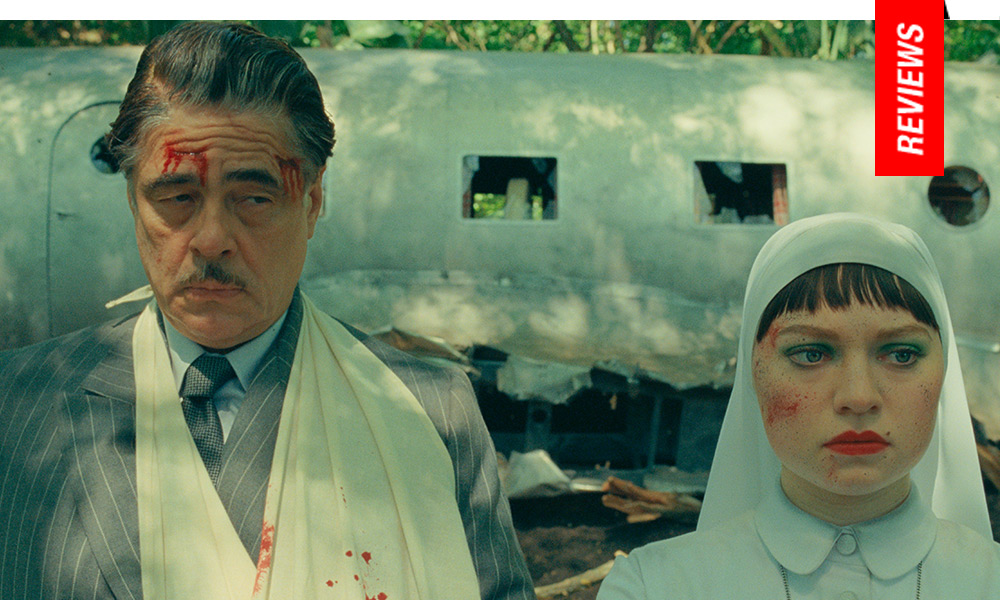Much Ado About Fussing: Anderson Spills More Twee
Zsa Zsa Korda (Benicio Del Toro) is an eccentric European tycoon who has amassed a coterie of powerful enemies, so much so he has just survived his sixth assassination attempt while crash-landing a compromised plane. The lucky industrialist decides he must plan for the future, for who knows how long his luck to survive such attempts will last, and so he decides to entrust his empire to Liesl (Mia Threapleton), his only daughter and a novitiate nun who has no relationship with her father, so to speak.
In addition to Liesl, he has nine sons, several of whom are adopted and none destined to be his heir. Oh, and Liesl thinks Zsa Zsa murdered her mother, though there’s a possibility his half-brother Nabor (Benedict Cumberbatch, donning a Boudu Saved From Drowning beard) was the responsible party. The US government has designs to sabotage Korda’s lofty plan titled the ‘Korda Land and Sea Phoenician Infrastructure Scheme’ which aims to mine an underutilized but perpetually war torn region for a vast, Ayn Rand-ish ambitious multipurpose venture (which also recalls murdered Italian industrialist Enrico Mattei). With his nun-child in tow, he must visit all the wealthy donors to collect a percentage of their promised advance against the interim shortfall which occurred due to the US government’s meddling, forcing the price of necessary goods required by the ‘scheme’ to skyrocket. But Zsa Zsa has been ‘fiddling’ with the previously signed contracts and so we get an endless assault of Anderson regulars during these various pit stops, including a second cousin (Scarlet Johansson), who he intends to marry. Zsa Zsa also experiences visions of death, wherein he must defend his life at the pearly gates where Bill Murray as God and a series of other notable actors are on cameo duty.
In the almost three decades worth of Wes Anderson’s specific cinematic universe, witnessing the unveiling of a new feature has come to feel like some arthouse version of The Emperor’s New Clothes. Plenty of renowned auteurs have been accused of remaking the same film over and over again, such as Hong Sangsoo, for instance. But Sangsoo often has an underlying motive and intention with fluctuations of tone and scope. The Phoenician Scheme is more of the overly manicured, archly affected roundelay of circumstance we’ve come to expect, and those prone to fancying dizzying, nonsensical dialogue with stiff punch lines and flat call backs can feast once more on Anderson’s endless buffet of blandness. There’s essentially nothing wrong with mind numbing drugs, but for those who have developed a tolerance for Anderson, his latest is merely a remix of his past daddy issue films. But by now, he’s a director of almost unparalleled esteem, so there’s no one like a Gene Hackman who’s now going to challenge his approach. A cast of Anderson alumni and nepo newbies have become his twirling puppets doling out the same exact sentiments and desperately trying to convince us it’s something new.
There’s certainly a vibrant, welcoming audience salivating for Anderson’s brand (namely, it would seem, the French, who also had a special yen for Jerry Lewis). Whatever The Phoenician Scheme seems to be offering, congratulations to those who are enlightened or enlivened through the consumption of its contrived excess. For those numb to its charms, it’s nothing short of trying.
Reviewed on May 18th at the 2025 Cannes Film Festival (78th edition) – Competition. 105 Mins.
★/☆☆☆☆☆
